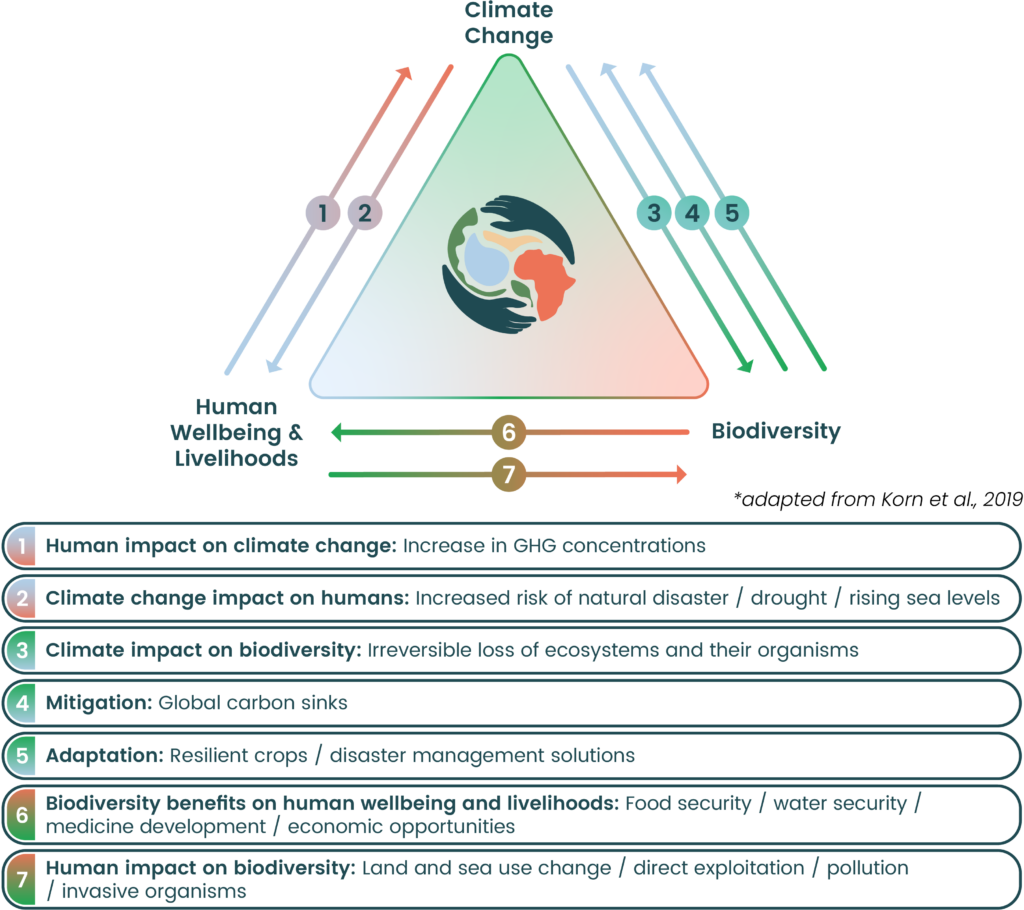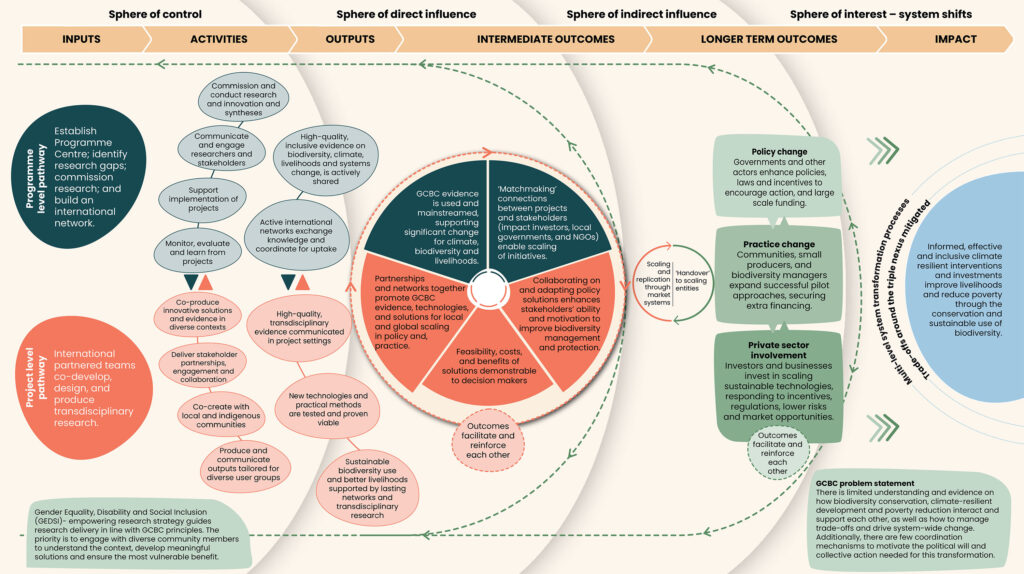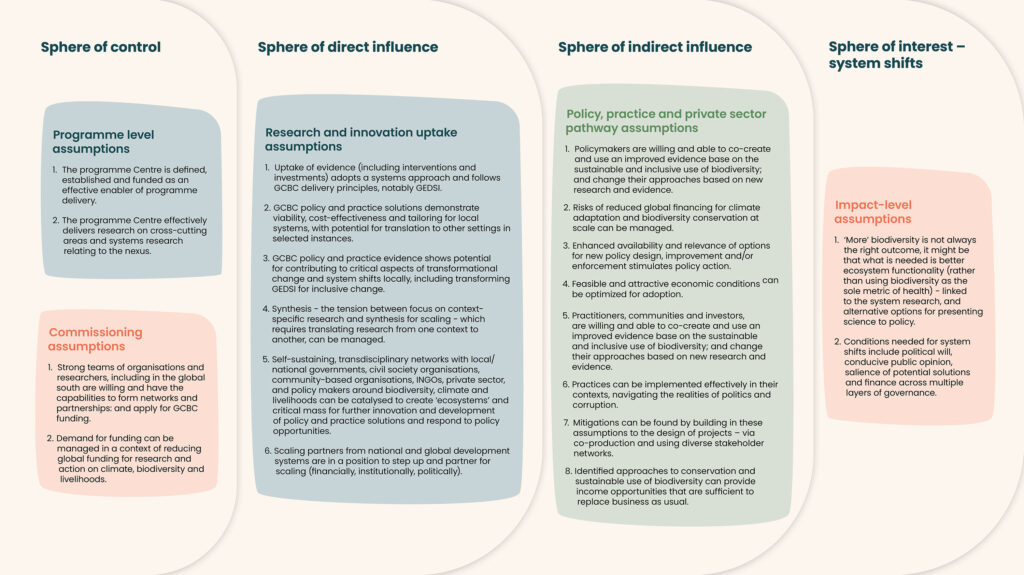Our Aim
We seek to unlock the potential of nature to deliver climate resilience and improve livelihoods.
Although we have just seven years left to achieve the Sustainable Development Goals (SDGs), progress is significantly off track and the world is facing a dual climate and biodiversity crisis. With global warming already at 1.1°C and predicted to reach at least 1.5°C between 2030 and 2052, we can expect higher temperatures, drought, and extreme weather events. Additionally, some 25% of plant and animal species are threatened by human actions, with a million species facing extinction (UNFCCC, 2021). Climate change and biodiversity loss make the delivery of the SDGs more difficult and affect the poorest and most vulnerable first and hardest (Dasgupta, 2021). By 2030 climate change and environmental degradation are likely to push a further 100 million people into poverty (World Bank, 2016).
GCBC helps address these issues by funding research into how the conservation and sustainable use of biodiversity can help tackle climate change and improve livelihoods in ODA-eligible countries. The programme was announced at COP26 with £40m of UK International Development funding. It contributes to the UK Government’s commitment to spend £3bn of its £11.6bn of International Climate Finance on nature and biodiversity over the 5 years to March 2026.
Why GCBC
Biodiversity holds immense potential to mitigate climate change and support the livelihoods of people most vulnerable to its impacts. Encompassing the full variety of life on Earth, biodiversity contributes to carbon storage, air and water filtration, pollution reduction, improved pollination, and soil erosion control.
Nearly half of our global gross domestic product depends on nature, and yet biodiversity is disappearing quicker than at any time throughout history. Preserving biodiversity can regulate the environment and ensure a habitable planet. GCBC funds research on the biodiversity–climate–livelihood nexus to advance climate mitigation and adaptation, strengthen resilience, and support sustainable livelihoods.

GCBC builds on the UK’s Dasgupta Review and helps countries achieve a nature-positive future by supporting commitments made by the UK government at the 26th United Nations Climate Change Conference and the 15th UN Biodiversity Conference, as well as supporting delivery of the Sustainable Development Goals.
Read about Sustainable Development Goal: 13 Climate Action
Read more on the Global Biodiversity Framework
What we do
- Fund biodiversity research: through our grant competitions we fund locally-led research to help unlock the potential of biodiversity in tackling climate and improving livelihoods.
- Disseminate research and learning: drawing on our research findings we facilitate open access learning and research through our events, digital channels, and publications.
- Foster partnerships: we foster cross-disciplinary and trans-disciplinary networking and collaboration by building capacity, making connections and breaking down silos between sectors.
How we work
- We work across research disciplines, breaking down silos and bringing researchers together.
- We work in partnership with researchers in recipient countries to create new ways of working and new knowledge.
- We value local and traditional knowledge and use it to develop appropriate, scalable solutions to tackle biodiversity loss, climate vulnerability and poverty.
GCBC Theory of Change
The GCBC Theory of Change addresses the problem statement that there is limited evidence and understanding of how biodiversity conservation, climate resilience, and poverty reduction interact, and how trade-offs between them can be managed. Existing systems also lack the coordination, partnerships, and mechanisms needed to translate research into effective policy, practice, and investment at scale.
The ToC outlines how the programme aims to catalyse transformational change at this intersection through two complementary pathways:
- Programme-level pathway: GCBC mobilises knowledge and networks, curates and communicates high-quality evidence from the GCBC portfolio, convenes international stakeholders, and positions proven solutions for scaling through policy, practice, and private sector actors.
- Project-level pathway: GCBC projects generate context-specific evidence, test innovative approaches to sustainable biodiversity management, and engage stakeholders and communities.
Together, these efforts demonstrate effective solutions, build capacity, and create opportunities for system-level shifts. The programme combines systems transformation theory with a behaviour change framework, promoting learning, co-creation, and collaborative action at multiple levels to contribute to lasting impact.


Partners and Governance

The Department for Environment, Food and Rural Affairs is the UK Government department responsible for improving and protecting the environment. The department takes a significant role in delivering the Government’s first international thematic priority – tackling climate change, environmental damage and biodiversity loss – noting the urgency of making progress before 2030. The GCBC is funded by Defra.

DAI is an international development consultancy. Their mission is to make a lasting difference in the world by helping people improve their lives and create a world in which communities and societies become more prosperous, fairer, and better governed, safer, healthier, and environmentally more sustainable. DAI is the GCBC’s Fund Manager.
Evidence Advisory Group and Independent Evaluator
The GCBC is also supported by:
- an Independent Evaluator which will be responsible for evaluating the GCBC process, performance, and impact.
- an Evidence Advisory Group, comprising experts from a diverse range of backgrounds and geographies to provide independent advice and scrutiny on the design, scope, outputs, and overall strategic direction of the GCBC.